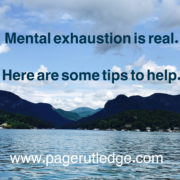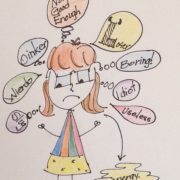The worry box technique is a simple skill used to help you manage when and how you worry. This sounds simplistic, and on its face it is. However, the results can truly help you place and pace worry better than simply allowing the random worries to crawl around in your head in the unending, unresolved circular pattern they tend to create.
Posts
Sooo many times, we need to complete a task, and the first thought is “I don’t feel like it!” Thinking in opposites is a strategy I want to offer you to challenge this thought. Here’s why.
I am a member of the Anxiety and Depression Association of America (ADAA), and they often publish articles of value that I like to share with you. The following “Ten Tips For Dealing With Mental Exhaustion” is one such article.
When you are stress and need some instant ways to connect to your immediate surroundings, test out a few of these 25 ways to get grounded fast. Grounding tips help you connect to the here-and-now when it feels like things are out of control.
Worry as a way to problem solve feels useful. Big hint: It isn’t. How to stop worrying becomes more doable when you think of it as spam. The worry thoughts pop instantly into your inbox, aka brain, with catchy titles and tantalizing “solutions.” Of course you supply those solutions, which allows a new email to pop up! Yay! Another problem to “solve” and you’re off to the races. It actually could be conceived as looking like a zig zag pattern in your mind. You go up with a problem, down with a “solution” so it feels like you are accomplishing something with the “action” of worry. And that zig zag can be infinite.
Humans are a problem solving species. We are wired for it, beginning perhaps with the evolutionarily imperative to find food. And boredom is a problem we are driven to solve.
In modern times, boredom can mean many things. Generally there are plenty of things to do, just nothing you want to do, or feel like doing. It’s the uneasy feeling of being unstimulated with nothing to occupy your mind. It’s one reason social media thrives. It’s the fastest feel-good balm we can turn to for that ping of instant gratification.
Thinking in opposites is a strategy I want to offer you. Here’s why.
My moods can drive me a little crazy at times. They can shift a fair amount, even though I’m a pretty even-keeled person. For example, I can feel super UP when a new client contacts me and it feels like a great fit. That’s a big dopamine hit for my little therapy brain.
Then there are other times when the occasional isolation of running a solo private practice gets to me. I’m a people person, especially when it’s one-on-one or when I’m with a small, intimate group of friends. Nothing brings me more pleasure than those connections.
But—as Mick says—you can’t always get what you want, or at least not immediately, or without some effort on your part.
What do I mean by your inner bully? Simply put, it is self criticism. And why would you want to put a cork in that beast? And furthermore, why bother, since no doubt you think being self critical is a valuable habit that will improve your performance and keep you safe. The paradox is that the self criticism will stop you from doing something that you fear failing at, or that might result in a painful consequence like rejection.
Being lonely is part of the human condition. We all succumb once in a while. Here are nine things when lonely you can do to change your mood. And remember, moods and feelings come and go. That is their nature. I would love your comments, and invite you to add the “tenth thing” to the list. You will have to read to idea #7 to understand the photo here!
Yes, loneliness is a bummer topic, and one of those that people respond to with the thought “NMP” (Not My Problem) and then change the channel. Yet it affects 25% of us in the USA, chronically. With the chronic nature of it come a host of health issues that can increase the chance of early death by up to 26%, according to the guru on the topic, John Cacioppo, a professor and researcher on the issue for more than twenty years. Why is this so?
PAGE RUTLEDGE, LCSW, CHt | Couples Counseling
Tel: 910-777-7243
Offices at:
5006 Randall Parkway (close to UNCW)
Wilmington, NC 28403
Free parking at office










